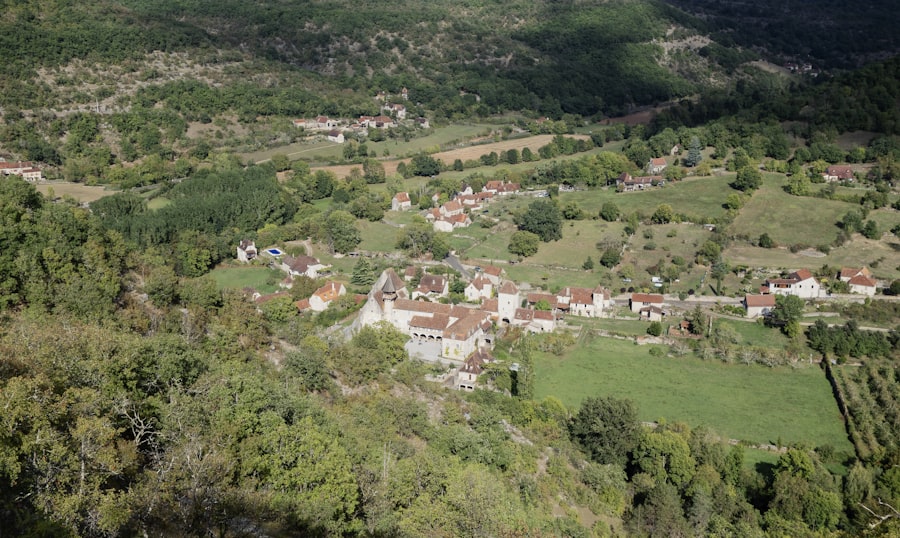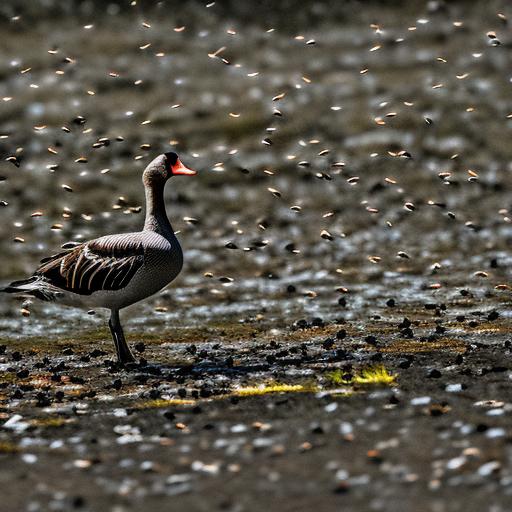Geese in parking lots have become a common sight in many urban areas. These large birds are attracted to parking lots for a variety of reasons, including the availability of food and water sources, as well as the open space for nesting and raising their young. While geese may seem harmless, their presence can actually cause a number of problems for both the parking lots and the surrounding areas. It is important to address this issue in order to maintain the safety and cleanliness of these spaces.
Key Takeaways
- Geese in parking lots can cause damage and create safety hazards for both people and vehicles.
- Understanding the behavior of geese can help in developing effective strategies for deterring them from parking lots.
- Geese can negatively impact the environment and surrounding areas, including water quality and vegetation.
- Legal considerations must be taken into account when removing geese from parking lots, as they are protected under federal law.
- Non-lethal methods, such as sound deterrents and landscaping techniques, can be effective in deterring geese from parking lots.
Understanding Geese Behavior in Urban Areas
Geese are attracted to parking lots for several reasons. One of the main reasons is the availability of food sources. Parking lots often have grassy areas where geese can graze on vegetation, as well as nearby bodies of water where they can find insects and other small prey. Additionally, parking lots provide open spaces that are ideal for nesting and raising their young.
In urban areas, geese behave differently than they would in their natural habitats. They have become accustomed to human presence and are less likely to be scared away by loud noises or sudden movements. This can make it difficult to deter them from parking lots once they have established a presence. Geese are also known to be territorial and aggressive, especially during nesting season, which can pose a safety risk to both drivers and pedestrians.
The Negative Impact of Geese on Parking Lots and Surrounding Areas
The presence of geese in parking lots can cause significant damage to the infrastructure. Their droppings can corrode pavement and leave unsightly stains on cars and buildings. In addition, their constant grazing can damage grassy areas, leading to erosion and the destruction of landscaping.
Geese can also be a safety hazard in parking lots. Their droppings create slippery surfaces that can increase the risk of slips and falls for pedestrians. In addition, geese are known to be aggressive when they feel threatened or when they are protecting their nests. This can lead to confrontations with drivers and pedestrians, potentially resulting in injuries.
Legal Considerations for Removing Geese from Parking Lots
When it comes to removing geese from parking lots, there are legal considerations that need to be taken into account. In many areas, geese are protected under wildlife conservation laws, which means that they cannot be harmed or killed without proper permits. It is important to consult with local wildlife management authorities to understand the regulations and obtain the necessary permits before taking any action.
In order to legally remove geese from parking lots, it is often necessary to implement non-lethal methods of deterrence. These methods aim to make the area less attractive to geese, rather than physically removing them. Examples of non-lethal methods include noise makers, decoys, and chemical repellents.
Non-Lethal Methods for Deterring Geese from Parking Lots
Non-lethal methods can be effective in deterring geese from parking lots. Noise makers, such as propane cannons or electronic devices that emit loud sounds, can startle geese and make them uncomfortable in the area. Decoys, such as fake predators or other birds of prey, can also be effective in scaring geese away.
Chemical repellents can be used to make the grass and other vegetation in parking lots less appealing to geese. These repellents are typically made from natural ingredients and are safe for both humans and the environment. They work by creating an unpleasant taste or smell that deters geese from feeding on the treated areas.
Physical Barriers and Landscaping Techniques to Keep Geese Out

Physical barriers can be used to keep geese out of parking lots. Fences or netting can be installed around the perimeter of the parking lot to prevent geese from entering. These barriers should be at least three feet high and have small enough gaps to prevent geese from squeezing through.
Landscaping techniques can also be used to deter geese from parking lots. Planting certain types of grass, such as tall fescue or Bermuda grass, can make the area less attractive to geese. These grasses are less palatable to geese and are more resistant to grazing damage.
The Benefits of Using Trained Dogs to Chase Geese Away
Using trained dogs to chase geese away can be an effective and humane method of deterrence. Dogs that have been specifically trained to work with geese can be used to patrol parking lots and scare away the birds. The presence of a dog can create a natural predator-prey dynamic that makes geese feel unsafe and encourages them to leave the area.
Using dogs has several benefits over other methods of deterrence. Dogs are highly effective at scaring geese away, as they are natural predators. They can cover large areas quickly and efficiently, making them a cost-effective solution for geese control. In addition, dogs can be trained to respond to specific commands, allowing for greater control and flexibility in managing the geese population.
The Importance of Regular Maintenance and Cleaning to Prevent Geese from Returning
Regular maintenance and cleaning are essential in preventing geese from returning to parking lots. This includes removing any food sources, such as spilled garbage or discarded food, that may attract geese. It is also important to regularly clean up goose droppings, as they can create slippery surfaces and attract more geese.
In addition, it is important to regularly inspect and repair any physical barriers or landscaping features that may have been damaged by geese or other wildlife. This will help ensure that the deterrent measures remain effective in keeping geese out of the parking lot.
Community Outreach and Education to Reduce the Presence of Geese in Parking Lots
Community outreach and education are key in reducing the presence of geese in parking lots. By raising awareness about the negative impact of geese and providing information on how to deter them, individuals and businesses can take proactive steps to address the issue.
Community outreach can include distributing informational materials, hosting workshops or seminars, and partnering with local organizations or wildlife management professionals to develop educational programs. By engaging the community and providing them with the knowledge and tools they need, it is possible to create a collective effort in reducing the presence of geese in parking lots.
Working with Local Wildlife Management Professionals to Develop a Comprehensive Plan for Geese Control
Working with local wildlife management professionals is crucial in developing a comprehensive plan for geese control. These professionals have the expertise and experience to assess the specific needs and challenges of each parking lot and develop tailored solutions.
A comprehensive plan may include a combination of non-lethal methods, physical barriers, landscaping techniques, and trained dogs. It should also take into account legal considerations and ensure compliance with wildlife conservation laws. By working closely with wildlife management professionals, parking lot owners and managers can implement effective and sustainable solutions for geese control.
The presence of geese in parking lots can cause significant damage and pose safety risks to both drivers and pedestrians. It is important to address this issue by implementing effective deterrence methods and taking proactive measures to prevent geese from returning. By working together with local wildlife management professionals and engaging the community through outreach and education, it is possible to create a safe and clean environment for everyone.
If you’re looking for effective ways to keep geese out of your parking lot, you might also be interested in learning about the importance of proper chicken coop maintenance. Poultry Wizard offers a helpful article on their website titled “Hannah Montana Chicken Coop: A Guide to Keeping Your Chickens Safe and Happy.” This article provides valuable insights on how to create a secure and comfortable environment for your chickens, which can also be applied to keeping geese away from unwanted areas. To read more about it, click here.
FAQs
What are some common problems caused by geese in parking lots?
Geese can cause a variety of problems in parking lots, including leaving droppings that can be slippery and unsightly, damaging landscaping, and creating a hazard for drivers and pedestrians.
What are some effective ways to keep geese out of parking lots?
Some effective ways to keep geese out of parking lots include using physical barriers like fences or netting, using decoys or scare tactics like loud noises or flashing lights, and modifying the landscaping to make the area less attractive to geese.
Are there any humane methods for keeping geese out of parking lots?
Yes, there are several humane methods for keeping geese out of parking lots, including using decoys or scare tactics that do not harm the geese, modifying the landscaping to make the area less attractive to geese, and using repellents that are safe for both humans and geese.
What should I do if I encounter a goose in a parking lot?
If you encounter a goose in a parking lot, it is best to give the goose plenty of space and avoid approaching it. Geese can be aggressive and may attack if they feel threatened. If the goose is causing a hazard or nuisance, contact a professional wildlife control service for assistance.
Why are geese attracted to parking lots?
Geese are attracted to parking lots because they provide a source of food, water, and shelter. Parking lots often have grassy areas and landscaping that provide food for geese, and they may also have ponds or other water sources. Additionally, parking lots are often quiet and undisturbed, providing a safe place for geese to rest and nest.
Meet Walter, the feathered-friend fanatic of Florida! Nestled in the sunshine state, Walter struts through life with his feathered companions, clucking his way to happiness. With a coop that’s fancier than a five-star hotel, he’s the Don Juan of the chicken world. When he’s not teaching his hens to do the cha-cha, you’ll find him in a heated debate with his prized rooster, Sir Clucks-a-Lot. Walter’s poultry passion is no yolk; he’s the sunny-side-up guy you never knew you needed in your flock of friends!







